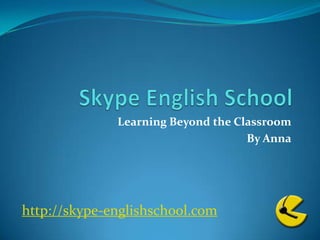
English Lesson Grammar 1
- 1. Skype English School Learning Beyond the Classroom By Anna http://skype-englishschool.com
- 2. Learning Objectives Today we are going to work on grammar We are going to go over the terms http://skype-englishschool.com
- 3. What is Grammar? Grammar is the system of a language. the structure and system of a language, or of languages in general, usually considered to consist of syntax and morphology. http://skype-englishschool.com
- 4. Active VoiceIn the active voice, the subject of the verb does the action (egThey killed the President). See also Passive Voice. AdjectiveA word like big, red, easy, French etc. An adjective describes a noun or pronoun. AdverbA word like slowly, quietly, well, often etc. An adverb modifies a verb. ArticleThe "indefinite" articles are a and an. The "definite article" is the. Auxiliary VerbA verb that is used with a main verb. Be, do and have are auxiliary verbs. Can, may, must etc are modal auxiliary verbs. Glossary of English Grammar Terms http://skype-englishschool.com
- 5. ClauseA group of words containing a subject and its verb (for example: It was late when he arrived). ConjunctionA word used to connect words, phrases and clauses (for example: and, but, if). InfinitiveThe basic form of a verb as in to work or work. InterjectionAn exclamation inserted into an utterance without grammatical connection (for example: oh!, ah!, ouch!, well!). Modal VerbAn auxiliary verb like can, may, must etc that modifies the main verb and expresses possibility, probability etc. It is also called "modal auxiliary verb". Glossary of English Grammar Terms http://skype-englishschool.com
- 6. Glossary of English Grammar Terms NounA word like table, dog, teacher, America etc. A noun is the name of an object, concept, person or place. A "concrete noun" is something you can see or touch like a person or car. An "abstract noun" is something that you cannot see or touch like a decision or happiness. A "countable noun" is something that you can count (for example: bottle, song, dollar). An "uncountable noun" is something that you cannot count (for example: water, music, money). ObjectIn the active voice, a noun or its equivalent that receives the action of the verb. In the passive voice, a noun or its equivalent that does the action of the verb. ParticipleThe -ing and -ed forms of verbs. The -ing form is called the "present participle". The -ed form is called the "past participle" (for irregular verbs, this is column 3). http://skype-englishschool.com
- 7. Glossary of English Grammar Terms Part Of SpeechOne of the eight classes of word in English - noun, verb, adjective, adverb, pronoun, preposition, conjunction and interjection. Passive VoiceIn the passive voice, the subject receives the action of the verb (egThe President was killed). See also Active Voice. PhraseA group of words not containing a subject and its verb (egon the table, the girl in a red dress). PredicateEach sentence contains (or implies) two parts: a subject and a predicate. The predicate is what is said about the subject. PrepositionA word like at, to, in, over etc. Prepositions usually come before a noun and give information about things like time, place and direction. http://skype-englishschool.com
- 8. Glossary of English Grammar Terms PronounA word like I, me, you, he, him, it etc. A pronoun replaces a noun. SentenceA group of words that express a thought. A sentence conveys a statement, question, exclamation or command. A sentence contains or implies a subject and a predicate. In simple terms, a sentence must contain a verb and (usually) a subject. A sentence starts with a capital letter and ends with a full stop (.), question mark (?) or exclamation mark (!). SubjectEvery sentence contains (or implies) two parts: a subject and a predicate. The subject is the main noun (or equivalent) in a sentence about which something is said. http://skype-englishschool.com
- 9. Glossary of English Grammar Terms TenseThe form of a verb that shows us when the action or state happens (past, present or future). Note that the name of a tense is not always a guide to when the action happens. The "present continuous tense", for example, can be used to talk about the present or the future. VerbA verb describes an action or state. - A word like (to) work, (to) love, (to) begin. http://skype-englishschool.com
